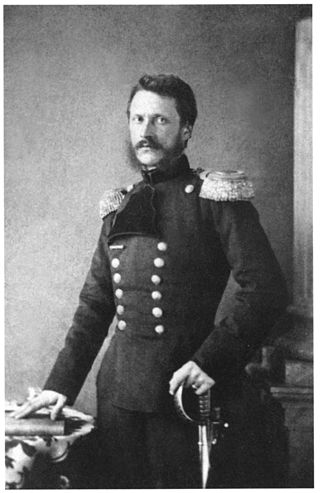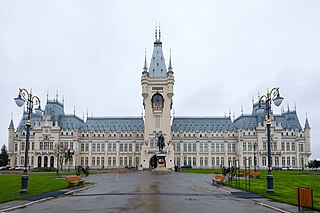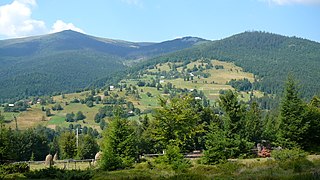
Alexandru Ioan Cuza was the first domnitor (prince) of the Romanian Principalities through his double election as Prince of Moldavia on 5 January 1859 and Prince of Wallachia on 24 January 1859, which resulted in the unification of the two states. He was a prominent figure of the Moldavian Revolution of 1848. Following his double election, he initiated a series of reforms that contributed to the modernization of Romanian society and of state structures.

Neamț County is a county (județ) of Romania, in the historic region of Moldavia, with the county seat at Piatra Neamț. The county takes its name from the Neamț River.

Iași County is a county (județ) of Romania, in Western Moldavia, with the administrative seat at Iași. It is the most populous county in Romania, after the Municipality of Bucharest.

Cucuteni is a commune in Iași County, Western Moldavia, Romania, with a population of 1,446 as of 2002. The commune is composed of four villages: Băiceni, Bărbătești, Cucuteni, and Săcărești.

The Palace of Culture is an edifice located in Iași, Romania. The building served as the Administrative and Justice Palace until 1955, when its designation and use was changed, and assigned to the four museums nowadays united under the name of Moldavia National Museum Complex. Also, the building houses the Cultural Heritage Conservation-Restoration Centre, and hosts various exhibitions and other events.

Elena Cuza, also known under her semi-official title Elena Doamna, was a Moldavian, later Romanian noblewoman and philanthropist. She was princess consort of the United Principalities and the wife of Alexandru Ioan Cuza, the first Romanian prince.
Ruginoasa may refer to several places:

Gheorghe (George) I. Brătianu was a Romanian politician and historian. A member of the Brătianu family and initially affiliated with the National Liberal Party, he broke away from the movement to create and lead the National Liberal Party-Brătianu. A history professor at the universities of Iași and Bucharest, he was elected titular member of the Romanian Academy. Arrested by the Communist authorities in 1950, he died at the notorious Sighet Prison.

Brăești is a commune in Buzău County, Muntenia, Romania. It is composed of seven villages: Brăești, Brătilești, Goidești, Ivănețu, Pinu, Pârscovelu and Ruginoasa.

Arieșeni is a commune located in Alba County, Transylvania, Romania. It has a population of 1,464 as of 2021. The commune is composed of eighteen villages: Arieșeni, Avrămești, Bubești, Casa de Piatră, Cobleș, Dealu Bajului, Fața Cristesei, Fața Lăpușului, Galbena, Hodobana, Izlaz, Păntești, Pătrăhăițești, Poienița, Ravicești, Ștei-Arieșeni, Sturu, and Vanvucești.

Cuzăplac is a commune located in Sălaj County, Transylvania, Romania. It is composed of eight villages: Cubleșu (Almásköblös), Cuzăplac, Gălășeni (Tóttelke), Mierța (Nyerce), Petrindu (Nagypetri), Ruginoasa (Lapupatak), Stoboru (Vásártelke), and Tămașa (Almástamási).

Valea Iașului is a commune in Argeș County, Muntenia, Romania. It is composed of nine villages: Bădila, Bărbălătești, Borovinești, Cerbureni, Mustățești, Ruginoasa, Ungureni, Valea Iașului and Valea Uleiului.

Ruginoasa is a commune in Iași County, Western Moldavia, Romania. It is composed of four villages: Dumbrăvița, Rediu, Ruginoasa and Vascani.

Dulcești is a commune in Neamț County, Western Moldavia, Romania. It is composed of six villages: Brițcani, Cârlig, Corhana, Dulcești, Poiana, and Roșiori.
Suceava Plateau is a geographic area in northeastern Romania, and soutwestern Ukraine. The Suceava Plateau comprises the northwestern part of the Moldavian Plateau. It has altitudes that exceed 700 m (2,300 ft) and long ridges, such as:
Bozieni may refer to several places in Romania and one in Moldova.

Alexandru Al. Ioan Cuza was a Romanian aristocrat and politician. He was the eldest of the sons adopted by Domnitor Alexandru Ioan Cuza and his consort, Elena Rosetti-Cuza. Public opinion and historians generally agree that both Cuza brothers were Cuza's natural sons from his mistress Maria Catargi-Obrenović, though another hypothesis has them as born to Maria from her liaison with Cezar Librecht, the Postmaster General and spy chief. His biological and his adoptive mother both belonged to the boyar aristocracy of Moldavia. Through Catargi, Alexandru and Dimitrie were half-brothers of Milan I Obrenović, the King of Serbia, and of General Radu Catargi. During his brief political activity, Alexandru was repeatedly described as a Russophile or more specifically an agent of the Russian Empire, resembling in this Maria and her father, Costin Catargi.

The Apuseni Natural Park is a protected area situated in Romania, in the administrative territory of counties Alba (28%), Bihor (32 %), and Cluj (40%).
Mihai Romilă was a Romanian football midfielder.



















